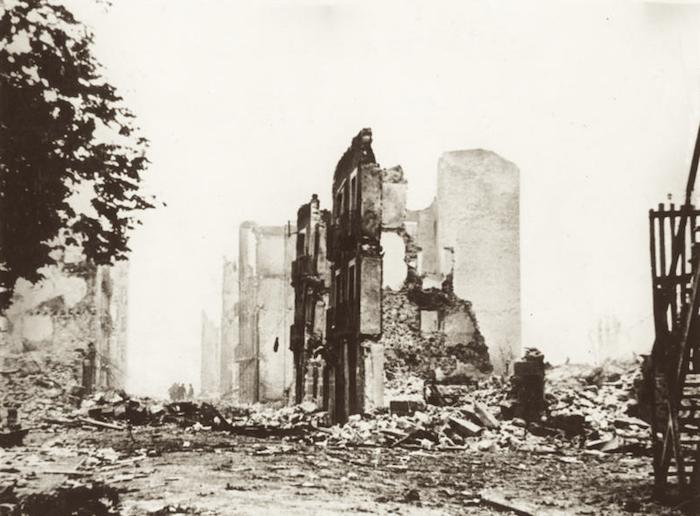Rather than hoist a sail in high winds, he was convinced that the motor would quickly take us farther from the shores of Estonia to make it less likely for us to be targets for Russian or German planes.
We were lucky that a schooner of a fellow Hiidlane, captain Paabor came into sight also on a course for Sweden. He took us aboard the refugee-packed steam-sailer. I remember distinctly the careful efforts of Paabor's crew in getting us, including two small children – myself and my cousin – hauled up and aboard his schooner, the Aado, in rough seas. It was a tricky maneuver with both vessels pitching wildly. Our sailboat wasn't abandoned but taken in tow.
All eleven of us were placed in the cargo hold, deep in the belly of the schooner. There was hardly any room for us as unexpected passengers. I recall the vomit and sea water sloshing in the bottom of the hold. After a couple of days of seasickness and wetness we reached the Swedish shore at Dalarö.
My mother said that the contrast between Hiiumaa which we had just left and Sweden was overwhelming. Lights shone from houses where people lived a normal existence. Street lighting illuminated streets and absent were the physical scars of war. The Swedish officials and people we met were gracious and kind in welcoming us. They totally lacked information about their neighbouring country directly east of them and were ignorant of the brutality and repression of the first Soviet occupation of Estonia in 1940-1941. However, Swedes were well informed about the fate of Finland, its Winter War for which the Soviet Union was expelled from the League of Nations and the War of Continuation of 1941-1944.
We were first interned in a quarantine facility. After a short period we were placed in a school in the Saltsjöbaden district in Stockholm. The school gymnasium was sectored off into family cubicles by ropes with blankets hanging from them to simulate walls. In here were 200 women with children. We slept on tiered bunk beds under paper blankets. The gym floor was covered with cardboard that started to turn into dust from the pounding of thousands of footsteps. The WCs were overloaded and washing facilities totally inadequate for the volume. Leaving the school for a walk in the city was initially forbidden. After some time it was permitted upon a written request. At first this primitive existence felt like an easygoing jail. My mother said that everyone longed for a hot sauna. Conditions were miserable but we were grateful for the Swedish kindness that provided us a welcoming refuge.
Escapees were still trickling in from our island. From them we heard of our destroyed home, of the some 20 people from our village that had been immediately shot by the Soviets, of those that had been quickly deported into Russia, of the arrests and of those who had been imprisoned. In spite of the heartbreak that this news brought to my parents, my mother and grandmother were still convinced that we would be back in a year's time and that life would begin anew in our own, free country.
Swedish language lessons were organized for us and my mother immersed herself in this. Aino Suits, the wife of the well-known author Gustav Suits was our teacher.
We celebrated our first Christmas in the refugee centre and I remember the traditional Swedish
‘lutfisk' was served as a delicatessen. But the fish, aged in lime, with its strange, potent odour, served with a raisin sauce was not a hit at our Christmas meal. We had left behind the special ‘Christmas feeling' in our homeland.
As the summer of 1945 approached my mother was offered a job as a counsellor in a summer camp for the children of Finnish refugees. I of course accompanied her and I've been told that at the end of the summer, my mother tongue, at the age of four, was Finnish. In any case it took a while for me to abandon the Finnish accent when speaking Estonian.
My father was offered a job on a merchant steamer as an officer. My mother and I were fortunate in subsequent summers to spend the summer on his ship sailing between European ports. My grandmother went to work on a farm as an all-around farm hand. Eventually my mother, and grandmother, with me, settled in Hälsingborg, southern Sweden, where my mother was appointed as the director at the Estonian child care/kindergarten centre. The institution was an essential part of our small Estonian community in that all able members of any refugee family had to work to make ends meet. Many were determined to gain enough financial resources to make a permanent home in Sweden or find passage to another country – mainly the USA, Canada or Australia.
In spite of the abundant opportunities available in Sweden, thousands still sought other more suitable destinations. They were resigned to the fact that Soviet totalitarianism would remain entrenched in the Baltic states indefinitely. Therefore it was essential to relocate elsewhere far from communist brutality and inhumanity.
My father was invited by the Canadian Steamship Company to be an officer aboard one of their ocean going ships sailing between South America and Canadian ports. He was thus not obliged to work in lumber camps, mines, building highways or dams, work requiring hard labour that Canadians were reluctant to take up. Our flight to freedom had found a home.
Laas Leivat




